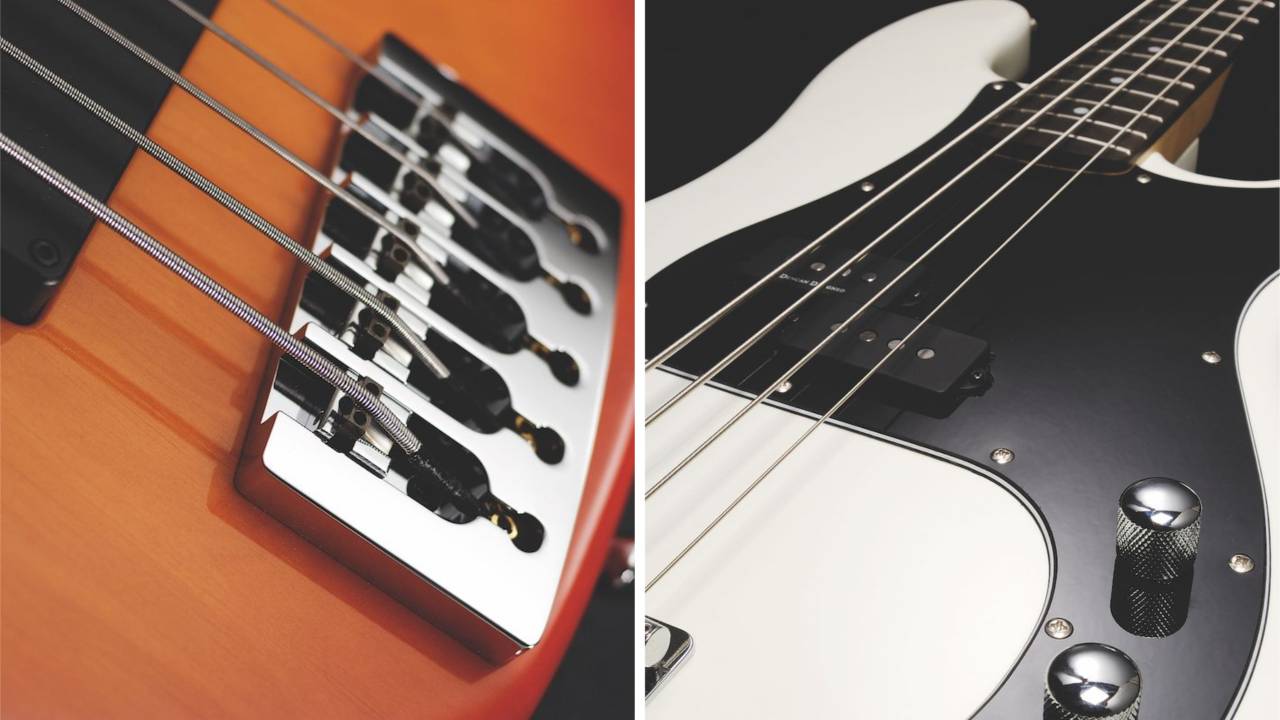Flatwound vs roundwound bass strings: What’s the difference?
Mellow and warm or bright and snappy? We look at the key differences between flatwound and roundwound bass strings

All the latest guitar news, interviews, lessons, reviews, deals and more, direct to your inbox!
You are now subscribed
Your newsletter sign-up was successful
When it comes to restringing your bass guitar, you’re faced with lots of options. There are all sorts of brands, materials and gauges that all offer the player something slightly different. One of those choices is whether you opt for roundwound or flatwound bass strings.
Roundwound and flatwound bass strings feel and sound quite different from one another, so if you’re looking to make a big change to your sound without having to rip out and replace pickups or electronics, then switching up the kind of strings you use can make quite an impact. Most basses come strung with roundwound strings, and they do tend to be more popular, but lots of players do opt for roundwound instead.
Here, we’ll go through the differences between flatwound and roundwound bass strings, covering the pros and cons of each. Like with so many of the options out there, neither one is better, but you might find that you prefer one over the other.
What are roundwound and flatwound bass strings?
Let’s just quickly go over what we mean when we say flatwound or roundwound. Pretty much all bass strings consist of a metal core wrapped by a metal winding. If you were to closely inspect the winding of a roundwound bass string, you’d see that it’s round – hence the name. If you think of circle shapes placed right next to each other so that the sides are touching, there would be a gap at the top – this is very much what’s happening on a roundwound string once it’s all wrapped up around the core. This means that you can feel the bumps and gaps of the windings underneath your fingers.
The core of a flatwound string is very much the same, but the winding is flat, instead of round. So, if you think of rectangles next to each other, the tops will line up and the surface won’t have gaps in it.
Flatwound vs roundwound bass strings: Feel
The first difference you’ll notice, apart from looking at them, is how they feel. Roundwound bass strings feel slightly bumpy – that’s because your fingers can detect the gap between the windings. Flatwounds, as you might expect, feel a lot flatter and smoother – some players even describe them as feeling slippy.
As a result, when you play flatwounds, there’s less friction between the string and your fingers, making it really easy to slide your fingers up and down. People who play lots of fast passages around the fretboard sometimes find that flatwounds make their life easier as they can get to their notes more quickly. If you’re just moving from rounds to flats however, this smoother string feel might mean you overshoot it and go past your note!
All the latest guitar news, interviews, lessons, reviews, deals and more, direct to your inbox!
Due to how they’re constructed, flatwound strings will probably have a little more tension than roundwound strings. If you’re swapping over to flats, then a little truss rod adjustment or general tinker with the action might help you along your way.
As with anything that’s different from your norm, going from one string type to another might take a little while to get used to, but if you like what it’s offering in terms of tone, then you’ll almost certainly be able to make it work for you.
Flatwound vs roundwound bass strings: Tone
Another big difference between flatwound and roundwound strings is how they sound. Immediately, you’ll notice that flatwound bass strings are much warmer and mellower sounding. Roundwound strings on the other hand are brighter, and have a lot more top-end detail.
With flats, you tend to still get good note definition, but there’s more low-end thump and, while they’re still well balanced tonally, their natural EQ curve will go down as you get to the higher frequency ranges. Through the right rig, flatwound strings can be punchy and articulate, but you don’t get a lot of the upper mids and trebles that you do with roundwound strings.
For a lot of music – blues, rock, soul, jazz and pop – flatwound bass strings can work really well in a mix, as they’re more confined to the bass frequencies. There’s less going on up where guitars and vocals would normally sit. If you think of the classic Beatles bass sound, most of that was done with flatwound bass strings.
You do sacrifice some sustain with flatwound strings though. The notes won’t last quite as long when compared to roundwounds, though that might not matter too much to some players. You can also help that along with a good compressor pedal.
Bassists that want more top-end presence, detail and articulation might find that they prefer roundwound strings. They sound brighter, and more open-sounding, plus it’s easier to dial in a growling, more aggressive bass tone. If it sounds like that naturally though, you can always just dial it out with your controls. With roundwound strings, there tends to be more differentiation between lows, mids and highs. Slap players will likely want to stick with roundwounds as they sound snappier and have more attack – flats might sound a bit too muffled for that style.
Of course, when we’re talking about how bass strings sound, there is the rig as a whole to take into account. The tone that your pickups naturally deliver and your bass amp will play a huge part in the final sound that you hear.
Flatwound vs roundwound bass strings: Other Considerations
Of course, it depends on the brand and the particular model, but flatwound bass strings, on the whole, cost more than roundwounds. You can get cheap ones, but if you compare the standard D’Addario flats with their regular roundwounds, for example, they’re quite a bit more expensive.
As an upside to that though, they do last longer. Flatwound strings aren’t normally replaced as much as roundwounds are. If you’re after the mellower, warmer sound associated with them, then you probably aren’t chasing the bright, zingy tone associated with fresh strings.
After spending a decade in music retail, I’m now a freelance writer for Guitar World, MusicRadar, Guitar Player and Reverb, specialising in electric and acoustic guitars, bass, and almost anything else you can make a tune with. When my head’s not buried in the best of modern and vintage gear, I run a small company helping musicians with songwriting, production and performance, and I play bass in an alt-rock band.

